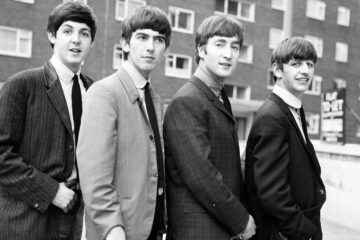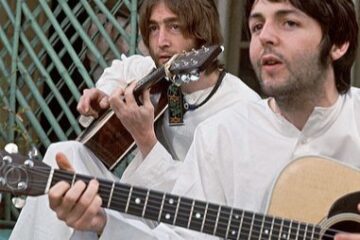In 1968, The Beatles flew out to India to find themselves. While this might have subsequently been scoffed at as a faddish venture, roped in by the manipulative “dirty old man” Maharishi Mahesh Yogi, in truth, they had a lot of finding to embark upon. Their childhoods had not been easy, pitted by profound losses, and then suddenly, they were thrust towards a precipice of fame that nobody before them had ever really endured.
If John Lennon hadn’t been a complex character already, then this bewildering whirlwind certainly ensured that a very singular psychology was ingrained. He barely had a chance to reconcile his past before he was flung into the spotlight, and you often get the impression from his work that he was trying to grapple with the ghost of his childhood as he matured amid the circus that surrounded him, thankfully in the presence of four close friends.
This search materialised in his Beatles demo ‘Child of Nature’. He had written this about his time in India, however, it is notable that the spirituality has little to do with anything related to the transcendental meditation he studied there and focuses more on his own idiosyncratic introspection. His reflection seems not to be limited to ‘child of nature’ in the typical sense of the phrase; instead, childhood seems to be a more literal motif, as you can detect in the lyrics below:
“On the road to Rishikesh
I was dreaming more or less
And the dream I had was true
Yes, the dream I had was true / I’m just a child of nature
I don’t need much to set me free
I’m just child of nature
I’m one of nature’s children / Sunlight shining in my eyes
As I face the desert skies
And my thoughts return to home
Yes, my thoughts return to homeI’m just a child of nature
I don’t need much to set me free
I’m just a child of nature
I’m one nature’s children / Underneath the mountain ranges
Where the wind that never changes
Touch the windows of my soul
Touch the windows of my soul / I’m just a child of nature
I don’t need much to set me free
I’m just a child of nature
I’m one of nature’s children”.
Although the luscious melody that would become ‘Jealous Guy’ was already in place with this demo, you can see why the four-piece rejected the track. There is something about it that feels like a scribbled, obfuscated insight in a diary. Of course, many demos have that halfway hallmark; however, on this occasion, ‘Child of Nature’ is distinctly too personal for the four-piece to pass off, and within that individuality is the sense of a revelation not yet fully revealed. Lennon was, in essence, still finding himself.
As Yoko Ono would remark when he finally honed the song and aligned it with his thoughts in a more deep-rooted sense that, ironically, proves more universally relatable given that he has exonerated his issue with more lucidity: “It was almost on a very conceptual, spiritual level”. His jealousy was not typical but instead grounded in something more profound.
As Lennon revealed when he commented: “When you’re in love with somebody, you tend to be jealous and want to own them and possess them 100 per cent, which I do. Intellectually, I thought owning a person is rubbish, but I love Yoko, I want to possess her completely. I don’t want to stifle her. You have so little as a child, I think once you find it, you want to hang onto it. You grab it so much, you tend to kill it.” While the song, ostensibly, seems to chart typical sexual jealousy, his remark about childhood refutes that.
This is what makes ‘Jealous Guy’ his defining effort. Much has been written about the various contradictions, shortcomings, godhead notions, wavering ideologies, and everything else regarding Lennon’s orchestrated iconography, and much of this musing comes from the fact that Lennon provided plenty of fuel for folks to mull over, for very few artists in history have seemingly pondered their own psychology so publicly and latterly pronounced it as a cultural marvel fit for the masses.
The line “I’m just a jealous guy” is not just some sober apology the morning after a drunken spat but a reconciliation of a character trope ingrained within Lennon from childhood. Discussing this with physiologists, it is explained that his perceived longing to possess and order things is a direct response to his decidedly contrasting childhood.
As the story goes, as a boy, his father tried to sneak him off to a new life in New Zealand away from his largely absent mother. However, she foiled the plan and publicly made him choose between the two in the middle of a Blackpool street. He never saw his father again. However, Lennon didn’t live with his mother after that either because she was with a new man, and it fell to his aunt Mimi to raise him.
Lennon remained on good terms with his mother, nevertheless, even though he chose to live with Mimi. However, tragedy would strike in July 1958, when Julia was killed by a car while walking home after visiting her sister’s house. The teenage Lennon never fully comprehended his mother’s sad death, and instead, he turned to drink in a bid to escape his thoughts and often found himself in internal turmoil.
In 1970, he embarked on a programme of primal scream therapy, during which he would literally yell to expunge his soul. “It’s just a matter of breaking the wall that’s there in yourself and come out and let it all hang out to the point that you start crying,” Yoko later said about the therapy to Uncut in 1998. She added: “He was going back to the days of when he wanted to scream, ‘Mother.’ He was able to go back to that childhood, that memory.”
‘Jealous Guy’ is a crystallising moment of the complex welter of his tempestuous past. It is the proclamation of a comprehended character and an advancement of the desire to make amends. And perhaps even more defining than that embodiment of his artistic mission is the fact that such a complex notion is the perfect fit for radio. As David Bowie once said, ”He would rifle the avant-garde and look for ideas that were so on the periphery of what was the mainstream and then apply them in a functional manner to something that was considered populist.”




